I often focus on the efforts of our men in uniform, so today is about the women.
Camp Chef Goes Outside the Wire
Managing dining facility operations is just one of many important jobs Soldier-chefs do here at Forward Operating Base Gabe, Baqubah, Iraq.
There are both male and female Soldiers serving as food service specialists in Fox Company, 4th Infantry Division’s 1-68 Combined Arms Battalion, however, the female Soldiers’ role plays a unique part in cultural awareness and communications with the Iraqi people.
Female Soldier-chefs are called on when male Soldiers encounter an Iraqi female that needs to be searched or questioned. It is culturally unacceptable for males to speak directly to Iraqi women. These troops are at times attached with infantry and other tactical elements that take part in patrols outside of “the wire.”
Every bit helps and this is just as dangerous as any "combat patrol" by the men. Last year around this time, three women marines were killed and 11 injured when their convoy was struck by a suicide bomber when returning from such a mission in Fallujah. Blackfive reminds us with a follow up report on these women and the complete story of that day as covered in Glamour magazine.
The convoy had been rolling down the highway for only a few minutes when Harding heard a fast exchange between her truck's driver and the gunner; it was something like "Are you going to shoot it or what?" An Iraqi car had pulled up alongside them. The marines in the lead Humvee had seen the car approaching and waved it off to the side of the road, but the car came barreling back toward the convoy.
Harding barely had time to process the driver's words when she heard the sound she'd feared since the moment she arrived in Iraq: the menacing hiss of a bomb about to go off.
The injuries some of these women suffered were terrible including second and third degree burns over 13% or more of the body. But, showing that these women are no wilting flowers, as soon as Cpl Salmaan got up she was yelling for a weapon:
Just as Padmore reached the scene, he saw Saalman staggering toward him, her charred, flayed hands held up before her, her eyes vacant in a blackened face. She'd lost her rifle during the explosion. "Sally, pull yourself together," he said. "You are not going to die. I promise: You are not going to die. But we need some leadership." He watched her expression change instantly from shock to rage. "Somebody give me a fucking weapon!" she screamed. "I need a fucking weapon!" The adrenaline pumping through her body obviously masked her pain. Padmore handed her his own M16 and headed off to find other wounded marines, with the sound of Saalman firing her gun toward the insurgents ringing in his ears.
Later, when the women were awared purple hearts, Gen. O'Dell began to weep.
It turns out that Jimenez misinterpreted O'Dell's sentiments: He was moved, he says, not by special sympathy for the women, but because he saw standing before him an unprecedented display of equality of the sexes. That day in Fallujah had been a "crystallizing moment," he says. Military leaders had always believed women marines would conduct themselves just as bravely as the men under deadly attack, he explains, but they'd never before had an opportunity quite like this one to prove themselves. "It's the difference between believing in a miracle," he says, "and then seeing one."
No miracle, it's happened before. The night of the attack, the women marines at base stepped up:
On the evening of June 23, as word of the disaster spread, a freckle-faced young female marine stationed in Ramadi, a city near Fallujah, had approached Colonel Robert Chase, who was helping run crisis control at the command center, to say she urgently needed to talk to him. He told her the timing wasn't good, but she insisted. Reluctantly, Chase stepped outside his office to meet with her—and in the hallway, he encountered about 10 more female marines. "Sir, we know we've had women killed," said the marine who'd first approached him. "We have to replace them—we want to go." Chase was stunned. "I'll be candid, it was one of the most emotional and profound moments for me," he says. "I don't often work with women as an infantry officer, but at that moment, there were no women there—there were just marines."
Blackfive links to stories about Sgt. Leigh Ann Hester who received the silver star for her actions in combat.
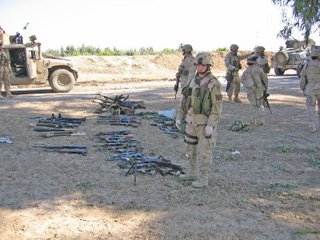
More from "outside the wire":
Inside an Afghan village, her unit was conducting random searches for Taliban fighters and weapons caches - then they heard what sounded like a cell phone.
That didn't sound right to Marine Sgt. Christine Griego.
"It's a poor country, and, if someone has a cell phone, it means they're doing something they probably shouldn't be," said Griego, an aviations mechanic with Marine Aircraft Group 26, 2nd Marine Air Wing. [snip]
On this particular search, there were two women who looked suspicious to Griego. Searchers cannot hold a weapon while they work because it might go off by accident - or worse, the enemy might get a hold of it.
"One woman had an infant (in one arm) and a bundle of something in another," Greigo said. "She had her arms under her burka which was unusual."
Reciting phrases from the Poshtun language, Griego asked the woman to raise her arms.
The woman didn't move.
"So I lifted her arms and saw the muzzle of an AK-47 begin to slip out," she said. "I slapped the gun down."
All the while, the Marine next to her kept his gun aimed at the Afghan woman. But when Griego slapped the gun down, the woman tried to run, she said.
Griego used her martial arts training to tackle her. The team found not only the gun, but several AK-47 magazines.
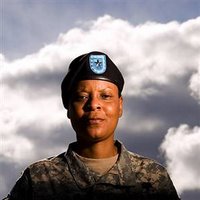 Women serve in a variety of capacities, both in theaters of operations, bases abroad and at home. Some have reached the pinnacle of leadership, like Brig. Gen. Shiela Baxter, Commanding General at Madigan in Tacoma, Washington. Brig. Gen. Baxter is the first female general in the Medical Corps:
Women serve in a variety of capacities, both in theaters of operations, bases abroad and at home. Some have reached the pinnacle of leadership, like Brig. Gen. Shiela Baxter, Commanding General at Madigan in Tacoma, Washington. Brig. Gen. Baxter is the first female general in the Medical Corps:I majored in physical education at Virginia State College but I wasn't sure what I was going to do when I graduated. My cousin Sandra Baxter was married to a captain at Fort Bragg. We went to visit him and the lightbulb came on. I loved the atmosphere and decided to join ROTC. It was an unusual choice because there were only a few women in the program. Col. Jona McKee, the professor in charge, was a Vietnam vet, so he actually knew what it took to be an officer. He didn't cut us any slack, and I thank him today.
When I first entered the Army, I was a lieutenant stationed at Fort Meade, Md. My battalion commander was Lt. Col. Robert Bowles. He called me in one day and he said, "Lieutenant Baxter, I want you to give me your 20-year plan." And I said, "Sir, I don't even know what I want to do in 20 minutes." But it focused me. I came back to him and I said, "Sir, I want to be like you. You are a battalion commander in a medical unit and that's my goal."
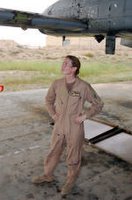 Women in the Air Force and other branches of service fly combat missions. One such pilot is Capt. Kim "Killer Chick" Campbell. Her A-10 "Warthog" tank killer was shot up while flying close air support over Baghdad:
Women in the Air Force and other branches of service fly combat missions. One such pilot is Capt. Kim "Killer Chick" Campbell. Her A-10 "Warthog" tank killer was shot up while flying close air support over Baghdad:Capt. Campbell didn’t win her laurels in court, though. She won them in the skies over hostile territory, Baghdad, giving air support to ground troops, when her Warthog took a crippling ground fire hit.
She told Staff Sgt. Jason Haag, who is with the 332nd Air Expeditionary Public Affairs office in Iraq (she flew with the 332nd). “I lost all hydraulics instantaneously (an aircraft’s hydraulic system controls many of the plane’s key functions), so I immediately lost control of the jet. It rolled left and pointed toward the ground, which was an uncomfortable feeling over Baghdad. The entire caution panel lit up and the jet wasn’t responding to any of my control inputs.”
She changed her control methods to allow her to fly her plane without hydraulics.
"The jet started climbing away from the ground, which was a good feeling because there was no way I wanted to eject over Baghdad.”
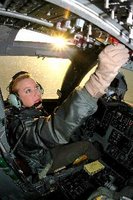 More ladies flying to support the men on the ground and the mission. A fellow blogger recently joined to become a CWO and fly helicopters. She graduated from basic and is in between waiting for her technical school.
More ladies flying to support the men on the ground and the mission. A fellow blogger recently joined to become a CWO and fly helicopters. She graduated from basic and is in between waiting for her technical school.I can't recommend this site enough. This page continues to track women in the military and has a long list of the women who have given their last full measure in Iraq and Afghanistan. The latest has been a young immigrant woman from California: Lance Cpl Juana Navarro Arelleno.
Marine Lance Cpl. Juana Navarro was killed Saturday in Iraq, leaving her Ceres family in mourning and the community feeling the loss of another one of its own.[snip]
The 24-year-old lance corporal died Saturday when she was struck in the head by a small-arms round as she was in a defensive position approximately 300 meters behind her vehicle as she guarded fellow soldiers. The mission was in the Anbar province of Iraq.
Women at War gallery:
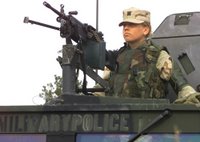
See more picures in the "read more" section of this post.
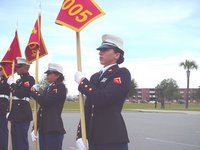
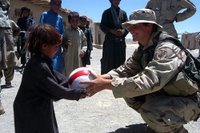
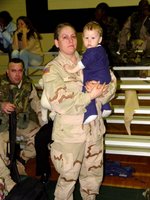
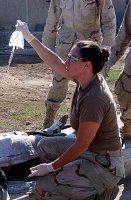
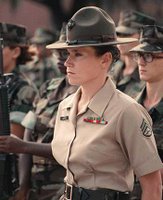

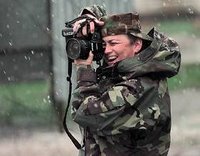
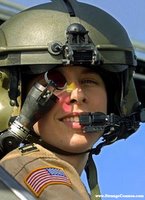
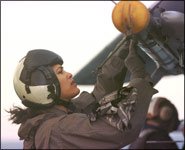







No comments:
Post a Comment